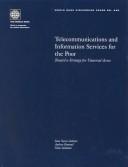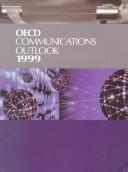| Listing 1 - 10 of 59 | << page >> |
Sort by
|
Book
ISBN: 9264166793 9264166785 Year: 2012 Publisher: [Place of publication not identified] : OCDE,
Abstract | Keywords | Export | Availability | Bookmark
 Loading...
Loading...Choose an application
- Reference Manager
- EndNote
- RefWorks (Direct export to RefWorks)
El presente estudio ha sido realizado por la Dirección de Ciencia, Tecnología e Industria de la ocde (dsti) bajo los auspicios del Comité de Políticas de la Información, Informática y Comunicación (Comité iccp) en respuesta a una solicitud del gobierno de México, a instancias de la Comisión Federal de Telecomunicaciones (Cofetel), y a través de la Secretaría de Comunicaciones y Transportes (sct), por ser ambas instituciones las encargadas de representar a México en el Comité iccp. La revisión de la ocde de la política y la regulación de las telecomunicaciones tomó como base las respuestas de las autoridades mexicanas a un cuestionario, así como los resultados de una extensa serie de entrevistas realizadas a los principales actores del sector de las telecomunicaciones durante una misión de investigación efectuada en México. El informe fue objeto de una revisión de pares en el Comité iccp el 27 de octubre de 2011, siendo la revisión encabezada por la doctora Mónica Ariño (Ofcom, Reino Unido) y el señor François Lions (arcep, Francia). Se terminó a principios de noviembre de 2011 y refleja los avances hasta ese momento.
Science and Technology --- Governance --- Mexico --- Telecommunication policy --- Telecommunication --- Telecommunication and state --- Government policy
Book
ISBN: 9812303812 9812305661 9812303820 Year: 2007 Publisher: Singapore : Institute of Southeast Asian Studies,
Abstract | Keywords | Export | Availability | Bookmark
 Loading...
Loading...Choose an application
- Reference Manager
- EndNote
- RefWorks (Direct export to RefWorks)
"Ninety-nine percent of Filipinos are waiting for a telephone and the other one percent for a dial tone..." - Lee Kuan Yew, November 1992. A decade after the above quote, far reaching reforms in the telecommunications sector has dramatically changed the situation in both the Philippines and Malaysia. By looking at the institutions and actors that drove these changes, this book examines state capacity, market reform, and rent-seeking in the two countries. In doing so, the study challenges conventional depictions of the Malaysian and Philippine states. It contends that despite the weakness of the Philippine state, reform occurred through a coalition that out-manoeuvred vested interests. In Malaysia, although considered a strong state, patronage and rent-seeking played key roles in policy adoption and implementation. The study also demonstrates how the nature of groups supporting reform shapes policy implementation and its outcomes. Finally, while liberalisation removes monopoly rent, this book shows that it can also create other types of rents.
Privatization --- Telecommunication policy --- Telecommunication --- Telecommunication and state --- Denationalization --- Privatisation --- Contracting out --- Corporatization --- Government ownership --- Government policy

ISBN: 1280356510 9786610356515 9264009515 9264009507 Year: 2005 Publisher: Paris, France : OECD,
Abstract | Keywords | Export | Availability | Bookmark
 Loading...
Loading...Choose an application
- Reference Manager
- EndNote
- RefWorks (Direct export to RefWorks)
The OECD Communications Outlook 2005 presents the most recent comparable data on the performance of the communication sector and policy frameworks in OECD countries. The data provided in this report map the six years of competition for many OECD countries that fully opened their market to competition in 1998. The 2005 edition also analyses the communications sector over the years following the ""dotcom bubble"" crisis and explores future developments. The OECD Communications Outlook provides an extensive range of indicators for the development of different communications networks and compares
Telecommunication --- Telecommunication policy --- Telecommunication and state --- Electric communication --- Mass communication --- Telecom --- Telecommunication industry --- Telecommunications --- Government policy --- Communication --- Information theory --- Telecommuting
Book
ISBN: 9264224289 9789264224285 Year: 1983 Publisher: Paris: OECD,
Abstract | Keywords | Export | Availability | Bookmark
 Loading...
Loading...Choose an application
- Reference Manager
- EndNote
- RefWorks (Direct export to RefWorks)

ISBN: 1280087935 9786610087938 0585450803 0821351214 Year: 2002 Publisher: Washington, D.C. : World Bank,
Abstract | Keywords | Export | Availability | Bookmark
 Loading...
Loading...Choose an application
- Reference Manager
- EndNote
- RefWorks (Direct export to RefWorks)
Telecommunication policy. --- Telecommunication --- Information technology --- Digital divide. --- Divide, Digital --- GDD (Global digital divide) --- Global digital divide --- Information society --- Society and telecommunication --- Telecommunication and state --- Social aspects. --- Government policy
Book
ISBN: 9264060111 9264060103 Year: 2012 Publisher: Paris : OECD,
Abstract | Keywords | Export | Availability | Bookmark
 Loading...
Loading...Choose an application
- Reference Manager
- EndNote
- RefWorks (Direct export to RefWorks)
This publication reviews the telecommunication market in Mexico, examines the current policy and regulatory framework of the sector and puts forward proposals for reform in order to develop competition in the market.
Book
ISBN: 926425546X 9264255451 Year: 2016 Publisher: Paris, [France] : OECD,
Abstract | Keywords | Export | Availability | Bookmark
 Loading...
Loading...Choose an application
- Reference Manager
- EndNote
- RefWorks (Direct export to RefWorks)
This innovative book combines results from research conducted in Colombia about how communications services consumers make consumption choices with OECD expertise in regulatory policy, behavioural economics, and data analytics, in order to help improve the consumer protection regime in Colombia. It focuses on the types of incentives that should be provided to change both provider and user behaviour, and considers where appropriate regulatory interventions may be needed to ensure that these incentives are realised. This work supports the Communications Regulator of Colombia in redesigning its consumer protection regime. This effort has refocused the regulatory framework from “protecting rights” towards making the market function best; this involves encouraging the providers to improve the quality of their services and rates offered in the market and to foster a better understanding of what is being offered and how. The book also makes specific recommendations on possible follow-up experiments to test some of the possible solutions to help communications services consumers better understand the information provided by service operators.
Telecommunication policy --- Telecommunication --- Law and legislation --- Electric communication --- Mass communication --- Telecom --- Telecommunication industry --- Telecommunications --- Telecommunication and state --- Government policy --- Communication --- Information theory --- Telecommuting --- Colombia
Book
ISBN: 9264208135 9264208127 1306737249 Year: 2014 Publisher: Paris : OECD Publishing,
Abstract | Keywords | Export | Availability | Bookmark
 Loading...
Loading...Choose an application
- Reference Manager
- EndNote
- RefWorks (Direct export to RefWorks)
As have OECD countries, Colombia has recognised that the communications sector, and in particular high-speed Internet access provided by fixed and mobile broadband, represents a key infrastructure for improving productivity and economic growth and in enhancing the welfare of its citizens. This report reviews policies and regulations in the telecommunication service sector in Colombia. It puts forward recommendations aimed at furthering regulatory reform and stimulating market competition and investment in the sector as a building block for the future development of the Colombian economy. It aims to help achieve one of the government's goals, which is to develop a knowledge-intensive society.
Business & Economics --- Transportation Economics --- Telecommunication policy --- Telecommunication --- Law and legislation --- Electric communication --- Mass communication --- Telecom --- Telecommunication industry --- Telecommunications --- Telecommunication and state --- Government policy --- Communication --- Information theory --- Telecommuting --- Colombia
Book
ISBN: 0821363581 082136359X 9786610238255 1280238259 Year: 2005 Publisher: Washington, DC : World Bank,
Abstract | Keywords | Export | Availability | Bookmark
 Loading...
Loading...Choose an application
- Reference Manager
- EndNote
- RefWorks (Direct export to RefWorks)
Over the past ten years, private-sector-led growth has revolutionized access to telecommunications. Every region of the developing world benefitted in terms of investment and rollout. This revolution would have been impossible without government reform and oversight. Advanced information and communication infrastructure (ICI) are increasingly important to doing business in a globalizing world. Governments, enterprises, civil society, workers, and poor populations in the developing countries need more affordable access. This report proposes strategies that governments can carry out to attract
Zonder onderwerpscode: wereldeconomie, ontwikkelingsproblematiek --- Telecommunication policy --- Telecommunication --- Privatization --- Deregulation --- Electric communication --- Mass communication --- Telecom --- Telecommunication industry --- Telecommunications --- Communication --- Information theory --- Telecommuting --- Telecommunication and state --- Government policy

ISBN: 9264170138 9786610081851 1280081856 9264172556 Year: 1999 Publisher: Paris : OECD Publishing,
Abstract | Keywords | Export | Availability | Bookmark
 Loading...
Loading...Choose an application
- Reference Manager
- EndNote
- RefWorks (Direct export to RefWorks)
At the end of the 20th century, the communications industry generates revenues of more than one trillion dollars and its efficiency is increasingly fundamental to economic and social development in OECD countries.; This reference presents comparable data on the performance and policy frameworks of the communications sector in OECD countries. It examines the major changes and future trends in the telecommunications industry and explores developments in areas such as the Internet and cable television.
Telecommunication policy. --- Telecommunication systems. --- Telephone systems. --- Telephony --- Telecommunication systems --- Communication systems --- Communications systems --- Systems, Communication --- Electronic systems --- Telecommunication --- Telecommunication and state --- Government policy
| Listing 1 - 10 of 59 | << page >> |
Sort by
|

 Search
Search Feedback
Feedback About UniCat
About UniCat  Help
Help News
News